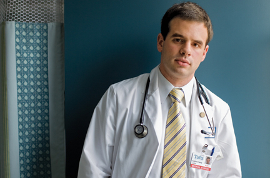The Survivor
By Bruce Morgan
Andrew Locke learned the value of good doctoring the hard way

“I learned what it’s like to be a patient, completely relying on my doctors to give me the care I needed to get better,” says Andrew Locke. Photo: Yoon S. Byun
Ten years ago, at summer camp, Andrew Locke, M13, was water-tubing on a lake in New Hampshire when his life changed in a flash. The motorboat towing him swung around and was heading directly toward him. When he saw the motorboat bearing down, he rolled over, avoiding a direct hit and certain death.
As the boat passed over him, its propeller severely gashed his left leg. Even with his left foot hanging by a thread, Locke, just 14 at the time, never lost his cool. He was able to remain conscious and even take part in his own rescue, despite severe blood loss and excruciating pain.
Six hours of surgery to save his life was just the beginning of his recovery. He spent the next two years in a wheelchair and endured additional surgeries and innumerable hours of painful rehabilitation. With the support of his family, friends and a team of doctors, Locke regained his strength and learned to walk again.
His grit and tenacity won out. By senior year he had been named captain of the varsity swim team at his Swampscott, Mass., high school and graduated at the top of his class. He went on to attend Washington University in St. Louis.
Can you describe your injuries from the accident?
Andrew Locke: My hip was broken. I had 12 to 13 deep lacerations from my hip all the way down to my foot. I had a compound fracture to both bones in my ankle, exposing the tibia and fibula. All the musculature in my leg was torn up, right down to the femur. I received eight units of blood in the ICU. The surgeon who did the operation described it as putting me back together from the bottom layer to the top.
What kind of shape were you in after you came through that first surgery?
I was in tough shape. The first few days, they weren’t sure I was going to be able to keep my leg. There was actually a pre-operative report that indicated that a leg amputation might be needed below the knee. The surgeon was able to save my leg. I had several subsequent surgeries. It was about two years before I could walk again on my own. It was a miracle.
How did your schooling work?
First I had to make the decision of whether or not I was going to start ninth grade with my class. I decided to continue on, to remain with my lifelong friends. I had tutors at home, and listened to classes on tape that my friends brought to me. One teacher always had everyone say hello to me at the beginning of each class.
I was always interested in science, and had a feeling, which was later confirmed through my experiences during my recovery, that I wanted to be a physician. I knew it was important to challenge myself academically, so I chose to stay in several honors-level classes. My teacher in honors biology told me there was no way I could stay in class if I couldn’t come for lab. So I would attend lab in a wheelchair with my leg elevated on pillows. My friends would push me around. By the end of the two hours, I was exhausted.
What was the social isolation like?
I’ve always defined my life through my experiences with family and friends. Going from being constantly surrounded by people to being home-schooled was very difficult. I spent many, many hours of lying in bed watching TV (laughs). I knew the items on The Price Is Right better than anyone.
How might this experience make you a better doctor in the years to come?
Through my recovery, I learned a new level of commitment. I worked as hard as I could, gaining strength, never quitting. I had physical therapy five days a week and went swimming at night to practice my walking [in the weightlessness of the pool]. I knew I had succeeded when I returned to the ski slopes two years after my accident.
I learned what it’s like to be a patient, completely relying on my doctors to give me the care I needed to get better. As a patient, I never wanted to be treated differently. You want things to go back to the way they were before you were sick. But at the same time you know that you need their help in order to heal.
Knowing what it feels like to be a patient will make me a more compassionate and devoted physician, doing everything I can to give my patients the same incredible quality of care that I received during my recovery.
This story first appeared in the Summer 2010 Tufts Medicine magazine. Bruce Morgan can be reached at bruce.morgan@tufts.edu.
